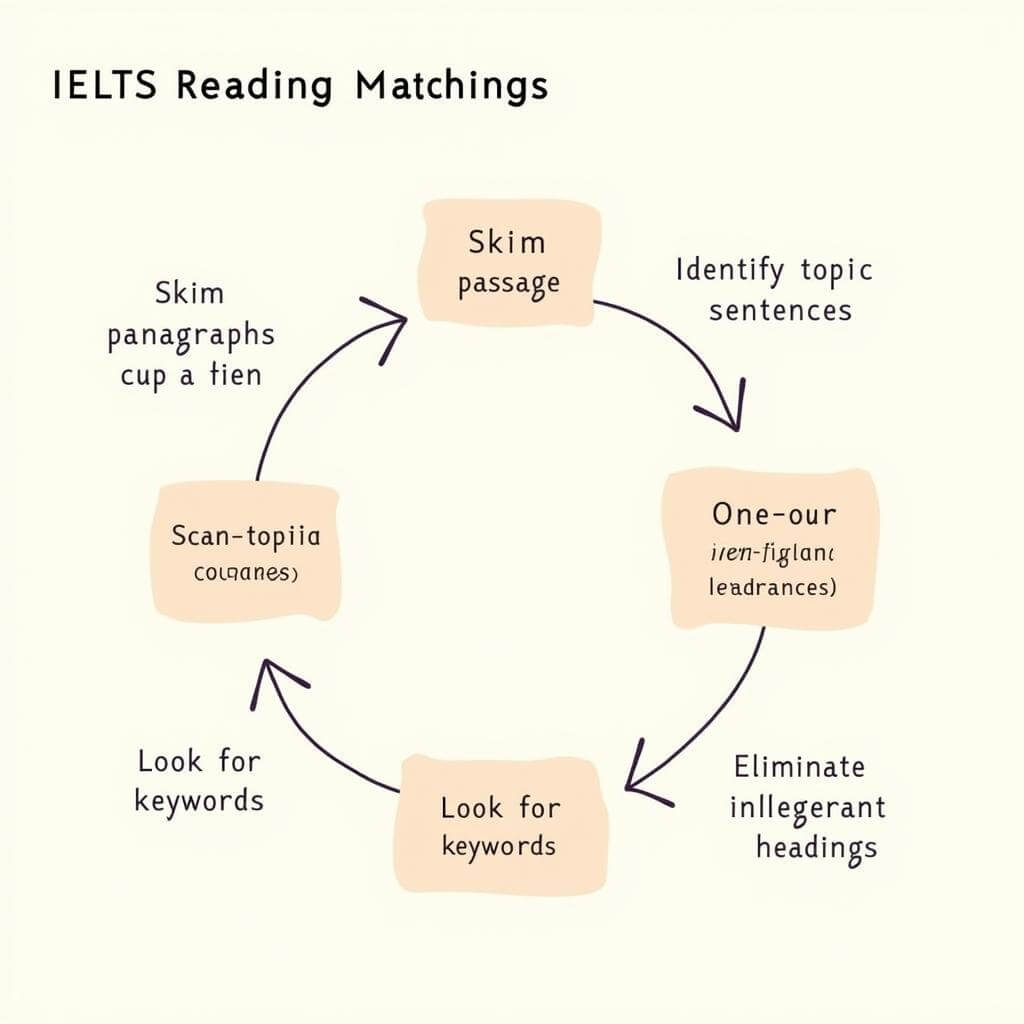Matching headings is a crucial skill in the IELTS Reading test, often challenging even for advanced learners. This guide will explore effective strategies for improving accuracy in matching headings, helping you boost your IELTS Reading score and approach this question type with confidence.
Understanding the Matching Headings Task
Before diving into strategies, it’s essential to grasp what the matching headings task entails. In this question type, you’re presented with a list of headings and must match them to the correct paragraphs or sections of the text. This tests your ability to identify main ideas and understand the overall structure of the passage.
strategies for improving accuracy in reading
Common Challenges in Matching Headings
- Misinterpreting the main idea of a paragraph
- Getting distracted by specific details rather than focusing on the overall theme
- Struggle with time management due to the complexity of the task
- Difficulty in distinguishing between similar headings
Key Strategies for Improving Accuracy
1. Skim and Scan Effectively
Start by quickly skimming the entire passage to get a general idea of its structure and content. Then, scan each paragraph to identify key information.
“Skimming and scanning are like taking a bird’s eye view of the text before zooming in on specific details,” says Dr. Emma Thompson, IELTS expert with 15 years of experience.
2. Identify Topic Sentences
Focus on the first and last sentences of each paragraph, as they often contain the main idea.
- Read the first sentence carefully
- Skim the middle of the paragraph
- Pay close attention to the concluding sentence
- Compare these sentences to the given headings
3. Look for Keyword Matches
Identify keywords in the headings and search for synonyms or related terms in the paragraphs. This can help you establish connections between the headings and the text.
strategies to boost IELTS reading score
4. Eliminate Irrelevant Headings
Use the process of elimination to narrow down your options. Cross out headings that clearly don’t match any paragraphs.
5. Practice Paraphrasing
Headings are often paraphrased versions of the main ideas in paragraphs. Improve your paraphrasing skills to better recognize these connections.

6. Understand Paragraph Functions
Learn to recognize different paragraph functions such as introducing a topic, providing examples, or concluding an argument. This can help you match headings more accurately.
7. Time Management
Allocate your time wisely:
- Spend 1-2 minutes skimming the entire passage
- Allow 1-2 minutes per paragraph for careful reading and matching
- Leave time at the end to review your answers
Advanced Techniques for Matching Headings
1. Analyze Paragraph Structures
Understanding common paragraph structures can help you quickly identify main ideas:
- Problem-solution
- Cause-effect
- Comparison-contrast
- Chronological order
2. Recognize Signposting Language
Pay attention to transitional phrases and signposting language that indicate the function or purpose of a paragraph:
- “In contrast”
- “Furthermore”
- “However”
- “As a result”
how to score high in IELTS reading matching questions
3. Practice Active Reading
Engage with the text by mentally summarizing each paragraph as you read. This helps you distill the main idea more effectively.
“Active reading is like having a conversation with the text. It keeps you engaged and helps you retain information better,” explains Professor James Wilson, IELTS trainer and curriculum developer.
4. Develop Your Vocabulary
A strong vocabulary will help you understand both the headings and the text more easily. Focus on:
- Academic word lists
- Synonyms and antonyms
- Idiomatic expressions
5. Use Contextual Clues
Sometimes, the relationship between paragraphs can provide clues about their main ideas. Pay attention to how ideas develop across the passage.
Common Pitfalls to Avoid
- Don’t get stuck on unfamiliar words – focus on the overall meaning
- Avoid choosing headings based solely on individual words that appear in the paragraph
- Don’t rush through the task – take time to carefully consider each option
- Beware of headings that seem too general or too specific
how to approach matching headings questions
Practice Makes Perfect
Improving your accuracy in matching headings requires consistent practice. Here are some ways to enhance your skills:
- Use official IELTS practice materials
- Time yourself when practicing to simulate exam conditions
- Analyze your mistakes and learn from them
- Read a variety of academic texts and practice summarizing main ideas
improving accuracy for paragraph matching
Conclusion
Mastering the art of matching headings in IELTS Reading is a valuable skill that can significantly improve your overall score. By implementing these strategies for improving accuracy in matching headings, you’ll approach this question type with greater confidence and precision. Remember, consistent practice and a methodical approach are key to success in IELTS Reading.
Frequently Asked Questions
How many headings are typically given in an IELTS Reading matching headings task?
Usually, there are more headings provided than needed, often 2-3 extra, to increase the task’s difficulty.
Can a heading be used more than once in the matching task?
No, each heading should only be used once. If you find yourself wanting to use a heading twice, it’s a sign to reconsider your choices.
What should I do if I can’t find a perfect match for a heading?
Choose the best possible match based on the main idea. Sometimes, the connection might not be immediately obvious but will be the most logical choice among the options.
Is it better to match easy paragraphs first or tackle them in order?
It’s often more efficient to start with paragraphs you feel confident about matching, then return to the more challenging ones later.
How important is the matching headings task in the overall IELTS Reading score?
While all parts of the test contribute to your score, matching headings often accounts for a significant portion of the marks, making it crucial to master this skill.